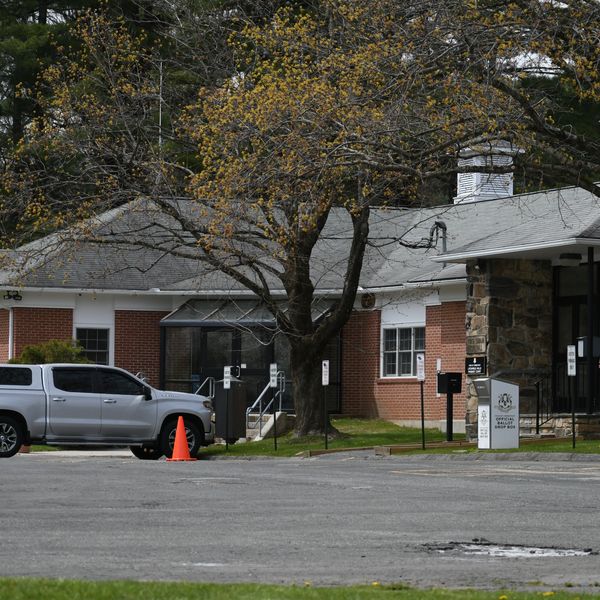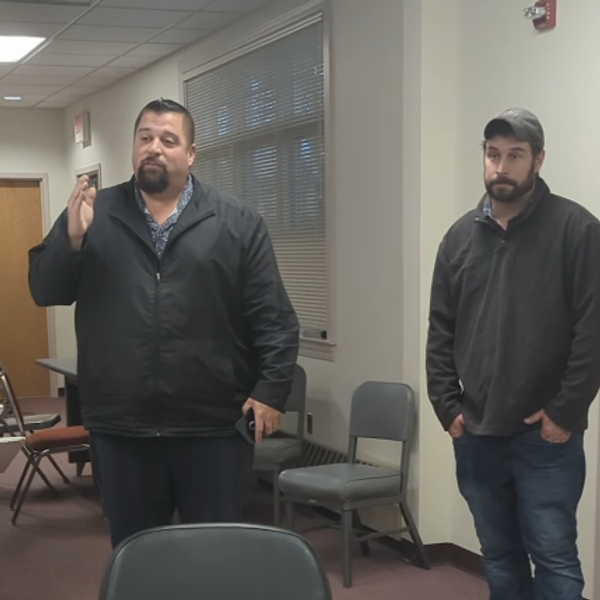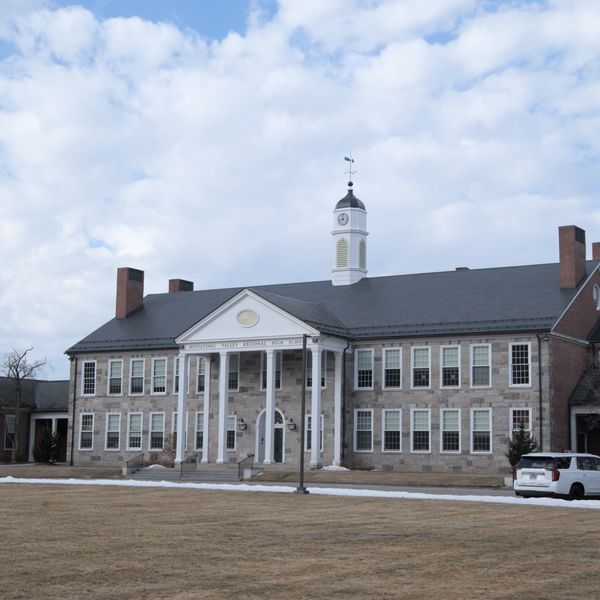Latest News
Fresh snowfall covers North Goshen Road after the Dec.13–14 storm, one of many winter weather events that require towns to decide how and where to apply road salt.
By Alec Linden
Snow returned to the Northwest Corner earlier this month, sending town highway and public work screws back into their annual cycle of plowing, sanding and salting —work that keeps roads passable but strains municipal budgets, equipment and the surrounding environment.
Connecticut lies within the so-called “Salt Belt,” where sodium chloride remains the primary defense against icy roads, even as officials weigh its financial and environmental costs.
In North Canaan, First Selectman Jesse Bunce said road salt is one of the town’s largest winter operating expenses, and reducing reliance on straight salt could bring both fiscal and environmental benefits. The town currently applies straight salt during most storms, but Bunce said he would like to shift toward blending salt with sand more often.
Bunce said the cost difference between the two materials is stark, estimating sand at roughly $20 per cubic yard compared to about $120 per cubic yard for salt. He said even partial blending could yield meaningful savings over the course of a winter while also reducing the volume of salt entering roadside soils and waterways. He said he and his highway crew have discussed experimenting with different blends to determine what works best under local conditions.
The town has also explored alternatives such as limestone in the past — an idea periodically raised because North Canaan has limestone quarries — though Bunce emphasized that no decisions have been made and further evaluation is needed. Beyond costs, Bunce said straight salt accelerates corrosion on trucks and equipment and contributes to environmental stress along roadways.
Salt-laden runoff, he said, can damage roadside trees, creating additional maintenance costs when trees decline or die. Reducing salt use, he said, could help protect vegetation while extending the lifespan of municipal vehicles. “Salt is tougher on our roadsides, our trees, things of that nature, which are another big operating cost,” Bunce said. “When these trees die on the roadside, we have to deal with them.”
Bunce, who owns and operates an excavation business, said equipment exposed to straight salt wears out significantly faster than machines spreading sand-and-salt mixtures, driving up maintenance and replacement costs for towns. When it comes to storms, North Canaan’s road crew handles them on a case-by-case basis, sometimes pre-treating roads ahead of storms and other times plowing several times before applying material. Certain roads pose particular challenges because of steep grades, making traction a key concern.
Falls Village First Selectman Dave Barger said his town follows a similarly adaptive approach, with the Department of Public Works applying sand and salt based on real-time conditions rather than a fixed formula. Road design and the surrounding landscape, he said, play a significant role.
“There are a lot of factors that play into how much product you put down — whether it keeps snowing, whether temperatures go up or down, and how much sun a road gets,” Barger said.
Narrow roads with heavy tree canopy tend to retain ice longer, requiring more salt, while more open roads that receive sunlight thaw faster and require less treatment. Many towns use sand–salt mixtures on back roads to improve traction, while applying straight salt in village centers. Local geography also shapes winter maintenance. Even modest elevation differences can affect temperatures enough to determine where ice forms first.
Norfolk, at roughly 1,200 feet, sits 400 to 500 feet higher than river-valley towns like North Canaan and often ices up sooner and holds snow longer.
With large areas to cover, Northwest Corner towns often require hours to complete plowing and salting routes. Sharon, for example, maintains 83 miles of roads divided into seven plow routes, each taking about four hours during storms.
For the current fiscal year, Salisbury budgeted $172,000 for salt and sand, Sharon $188,000, Kent $140,000, Cornwall $61,000 and Falls Village $42,000. North Canaan budgeted $46,000 for sand and salt, down from the previous two years.
Keep ReadingShow less
McEver nixes subdivision plan; riverfront property now slated to be conserved for public use
Dec 22, 2025
Courtesy of the Northwest Connecticut Land Conservancy
NORTH CANAAN — The plan for a 20-lot subdivision off Honey Hill Road has been dropped and instead, the land, owned by H. Bruce McEver, could become a large public nature preserve.
The announcement came at the Dec. 15 meeting of the Board of Selectmen, when Catherine Rawson, executive director of the Northwest Connecticut Land Conservancy, went before the board to request a required letter of approval allowing the conservancy to seek state grants for the purchase. She emphasized that significant work remains, including extensive surveys, before a deal is completed and the deed is transferred.
Should all proceed as planned, a transfer of this nature generally takes 24 to 36 months to close, she said. Once finalized, the land must be opened to the public within six months. Funding decisions from the state— particularly through the OpenSpace and Watershed Land Acquisition program administered by the Department of Energy and Environmental Protection — are expected inmid-2026. Additional funding will also be sought through the federal Highlands Conservation Act, as well as from private donations.
Rawson said the conservancy, which is based in Kent, had been in discussion with McEver and is delighted to partner with him to leave what she described as an extraordinary legacy. She expressed gratitude to him for making this decision.
“I’m a conservationist at heart,” McEver said, talking about his love of the environment since childhood. He said his initial motivation for seeking to develop the property was to help address the housing shortage in North Canaan, but construction costs were far lower when the idea first arose.
In today’s market, he said, selling the lots would be difficult, making the shift away from development largely an economic decision. McEver spoke of how beautiful the property is, with its hundreds of trees, and how he’s worked to remove invasives there. He said he is pleased to be working with the land trust on the project.
The land sits off Honey Hill Road, and the conservancy plans to purchase approximately 245 acres, which borders over a mile of the Housatonic River and a portion of the Blackberry River.
The property offers an extensive core forest, high biodiversity and intact wildlife habitat, which Rawson said “ranks it among the most ecologically valuable and climate-resilient landscape in the region. I’m delighted. It’s one of the most important conservation pieces in Northwest Connecticut in the organization’s history. We’re so pleased to partner with Bruce for the benefit of the community for generations to come."
The conservancy envisions creating miles of hiking trails on the land, some of which could be handicap accessible. Public access to the river has yet to be determined. Rawson said as part of the broader vision, the conservancy is exploring the possibility of installing a pedestrian footbridge over the river, which would result in the potential linking of lands on both sides, “strengthening regional trail networks and enhancing connectivity between the communities of North Canaan and Salisbury.”
Tim Abbott, executive director of the Housatonic Valley Association, said the cost to acquire the property is $2.25 million.
Abbott has been deeply involved in the project. At the time the subdivision application was first heard in October 2023, he was chairman of the Planning and Zoning Commission and conservation director of HVA. He was vocal about his opposition to the plan and HVA became an intervenor in the proceedings.
Always recusing himself during discussions of the subdivision, in November 2024, he resigned from the commission following pressure from proponents of the plan who were also advocating for a text amendment to the regulations regarding road lengths on dead-end streets and number of lots allowed on such streets.
When the commission did not act on the text amendment request, the applicant withdrew the application and submitted a new one containing 33 lots but later withdrew it and went back to the original 20 lots after the amendment was approved.
Abbott echoed Rawson’s words of delight with the outcome. “All along, HVA wanted a real conservation project,” he said, adding a network of conservation organizations really “kept their eye on the ball. We’re very happy; it’s a huge win for everyone.”
Abbott noted the four conditions imposed on the application’s approval never progressed. These included a deed restriction protecting a 300-foot buffer extending inward from the edge of the river, a revegetation and erosion-control plan along 20 feet of the river, an endangered species survey and an archeological survey.
“The conservation of the McEver lands in North Canaan represents a rare opportunity to safeguard a landscape of exceptional importance while creating a lasting public benefit—protecting land, water, wildlife habitat and recreational access for generations to come,” Rawson said.
Founded in 1965, the Northwest Connecticut Land Conservancy is the state’s largest land trust, protecting 14,200 acres in Litchfield and northern Fairfield counties.
Keep ReadingShow less
Cornwall's Parade of Lights, Sunday, Dec. 21.
Photo by Tom Browns
CORNWALL — A variety of brightly decorated vehicles rolled through Cornwall Village the night of Sunday, Dec. 21, for the town's inaugural Parade of Lights. It was well attended despite the cold conditions, which didn't seem to dampen spirits. The various vehicles included trucks, utility vehicles, a school bus and rescue apparatus from Cornwall and surrounding towns.
Keep ReadingShow less
Sharon Hospital
Stock photo
SHARON — Northern Dutchess Paramedics will cease operating in Northwest Connecticut at the start of the new year, a move that emergency responders and first selectmen say would replace decades of advanced ambulance coverage with a more limited service arrangement.
Emergency officials say the change would shift the region from a staffed, on-call advanced life support service to a plan centered on a single paramedic covering multiple rural towns, raising concerns about delayed response times and gaps in care during simultaneous emergencies.
The decision became known on Dec. 11, when communities were informed that NDP’s service would end as of Jan. 1, according to Andrea Downs, president of the Falls Village Volunteer Fire Department and an employee of NDP.
Founded in 1994 and based in Rhinebeck, New York, NDP has provided advanced and basic life support ambulance services to communities in Dutchess and Columbia counties in New York, as well as parts of Litchfield County, for nearly three decades.
How the change came about was outlined by Al Tortorella of Sharon, also an employee of NDP.
Tortorella said every Connecticut municipality is required to have an advanced life support provider. For the past 28 years, Sharon Hospital has fulfilled that requirement by signing an annual hospital-sponsored agreement with NDP. In recent years, the agreement was signed by Dr. Ronald Santos, head of the hospital’s emergency department, under whose medical license NDP operates.
When NDP recently approached Santos to renew the agreement, he said he could not sign it, a decision that took the organization by surprise, Tortorella said.
Area towns operate volunteer ambulance squads that provide basic life support. NDP supplements those crews by delivering advanced medical care, administering medications and conducting inter-facility transports.
Sharon Hospital, which is part of Nuvance Health, merged earlier this year with Northwell Health. Downs and Tortorella said they understand that the hospital system plans to replace NDP with its own paramedic service.
Under the proposed arrangement, a single paramedic would cover the Sharon Hospital catchment area, starting each 12-hour shift in New Milford before traveling to Sharon. If needed, the paramedic would be assisted by a paid EMT provided by Nuvance.
Tortorella sharply criticized the model.
“It’s a system designed to fail,” Tortorella said. “This is a huge issue.”
Downs echoed those concerns, noting that the paramedic’s 12-hour shift would include significant travel time between locations.
“I’m very concerned about the health and well-being of residents in the Northwest Corner,” she said. “We don’t want any reduction in services for patients in the region. I can’t understand the rationale of taking services away. Northwell wants to maintain a model of corporate health care, but they can’t put a face to the people and culture we’ve established here. We’re talking life and death.”
Downs emphasized that the decision does not involve layoffs at NDP, which was recently acquired by Empress. She said there is ample demand for paramedic services in New York state and that employees’ jobs are secure. The concern, she said, is for the safety of families, friends and neighbors in Northwest Connecticut.
In an interview, Sharon Hospital President and CEO Christina McCulloch and Andrea Rynn, assistant vice president for community, government and public relations at Northwell Health, addressed the decision to discontinue the hospital-sponsored agreement with NDP.
“Recently, concerns were brought to our attention about compliance and [a lack of] communications,” they said. “This information left us unsettled and unable to be a sponsoring hospital at this time.”
They acknowledged that the timing of the transition was far from ideal. “Despite the tight timing, we are actively developing a coverage plan in concert with local first responders and area leaders. This is a process that is just beginning and we are confident it will strengthen over time.”
McCulloch and Rynn said the hospital and health system remain committed to maintaining service continuity and working with community partners to enhance emergency medical services across the region.
The pair have met with representatives of area ambulance squads and on Friday held a session with the region’s first selectmen.
Gordon Ridgway, first selectman of Cornwall, said people are feeling rushed by the move. They are concerned that services will be lessened, not enhanced.
“This is the most important thing in town; picking up people in the middle of the night and providing immediate care. It has to be done well.”
Falls Village First Selectman David Barger said the meeting was productive and answered some questions, but left others unresolved.
He said he plans to host a meeting in January at the town’s emergency services center, inviting ambulance providers, first selectmen and hospital representatives to continue the discussion.
Keep ReadingShow less
loading













